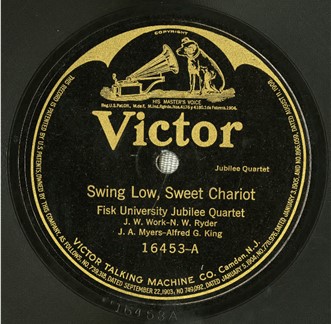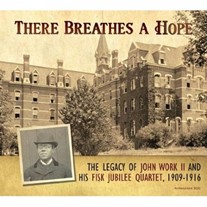
Male Quartets and Quintets

The Victor Recording Label's Recording of the Fisk Jubilee Quartet and John W. Work II (Work, J. W. 1909)
Although members of the first generation of Fisk Jubilee Singers were born in slavery, some were in their mid-teens when they sang on tour. Following the success of the Fisk Jubilee Singers, many other institutions of higher learning formed choirs, generally as jubilee singers, to tour and raise funds. These included the Hampton, Tuskegee, Wilberforce, and Utica institutes. A few imposters claiming to seek support for Black universities were also on the circuit. In 1904, Charles Williams from Holly Springs, Mississippi, formed the Williams Jubilee Singers, "The World's Greatest Harmonizing Octette." Previous jubilee companies had often had ten to a dozen members or an octet making a "double quartet." Still, the increasing tendency was to reduce the groups' size and feature, as did Williams, a quartet (or quartette).
Publicity material for the Williams Jubilee Singers emphasized their musical training at universities and colleges such as Rust, Drake, Livingston, and Oberlin. More jubilee companies appeared, emphasizing the singers' formal training and musical credentials.
The earliest of the jubilee groups to record was the Fisk University Jubilee Quartet, under the direction of John Wesley Work II, who sang tenor. The well-drilled quartet expanded the repertoire of jubilee songs by singing both popular spirituals and Stephen Foster sentimental ballads at their December 1909 sessions for Victor; by 1916, they had over thirty items issued on 78 rpm discs and nine on Edison cylinders. However, it was not until 1919 that the first titles appeared as being performed by the Fisk University Jubilee Singers. The Rev. James Andrew Myers was the only performer belonging to both the Quartet and the new Singers, who were, in fact, a quintet. Unfortunately, on the sixty titles issued between 1909 and 1926, few elements in style, format, personnel, or even repertoire can be considered indicative of the original sacred songs and performances whose range and passion had so moved world audiences.

There Breathes a Hope: The Legacy of John Work II and His Jubilee Quartet, 1906-1916
Listen to the track " Swing Low, Sweet Chariot " sung by the Fisk Jubilee Quartet (Work, J. W. 1909).





